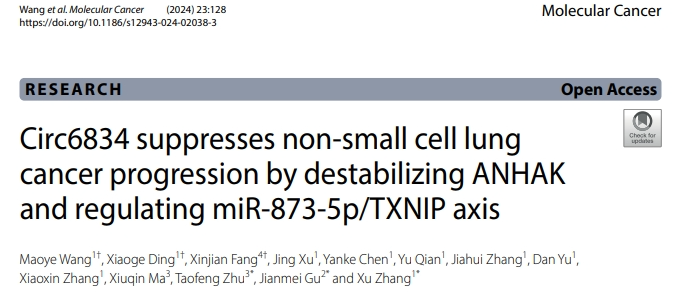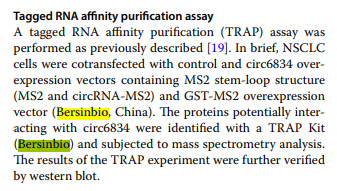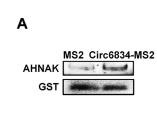Toggle Navigation
Time of publication:June,2024

Background: Circular RNAs (circRNAs) play important roles in cancer progression and metastasis. However, the expression profiles and biological roles of circRNAs in non-small cell lung cancer (NSCLC) remain unclear.
Methods: In this study, we identified a novel circRNA, hsa_circ_0006834 (termed circ6834), in NSCLC by RNA-seq and investigated the biological role of circ6834 in NSCLC progression in vitro and in vivo. Finally, the molecular mechanism of circ6834 was revealed by tagged RNA affinity purification (TRAP), western blot, RNA immunoprecipitation, dual luciferase reporter gene assays and rescue experiments.
Results: Our results showed that circ6834 was downregulated in NSCLC tumor tissues and cell lines. Circ6834 overexpression inhibited NSCLC cell growth and metastasis both in vitro and in vivo, while circ6834 knockdown had the opposite effect. We found that TGF-β treatment decreased circ6834 expression, which was associated with the QKI reduction in NSCLC cells and circ6834 antagonized TGF-β-induced EMT and metastasis in NSCLC cells. Mechanistically, circ6834 bound to AHNAK protein, a key regulator of TGF-β/Smad signaling, and inhibited its stability by enhancing TRIM25-mediated ubiquitination and degradation. In addition, circ6834 acted as a miRNA sponge for miR-873-5p and upregulated TXNIP gene expression, which together inactivated the TGF-β/Smad signaling pathway in NSCLC cells.
Conclusion: In conclusion, circ6834 is a tumor-suppressive circRNA that inhibits NSCLC progression by forming a negative regulatory feedback loop with the TGF-β/Smad signaling pathway and represents a novel therapeutic target for NSCLC.
Partial results of cooperation



BersinbioTM cooperative technology:TRAP
Original link:10.1186/s12943-024-02038-3